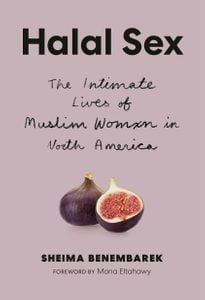I’m 43, I’ve Been in Long-Term Relationships and I’m a Virgin By Choice

In her new book Halal Sex, Sheima Benembarek shares personal stories of Muslim immigrants and their relationships to sex and sexuality. In this chapter, Taslim, a virgin in her forties, shares her experiences with inter-faith relationships, navigating differing approaches to intimacy and maintaining boundaries around family.
At around twelve or thirteen years old, Taslim began developing crushes on boys in her class, though they never lasted long. Taslim knew there was no way she could get away with having an actual boyfriend. She couldn’t risk getting caught and knew better than to trust anyone at school. “I had a friend who was Indian Muslim, same age as me, and she had a boyfriend, and another girl from a very conservative family told on her and tried to get her in trouble.” She knew that they were being watched by adults most of the time, even while they socialized. Taslim used to go to the mall, a seven-minute walk from school, always in a group in case there was an auntie there who would report back to her parents. She once got in trouble for walking home with a neighbour simply because he was a boy.
At the time, there were unsettling stories circulating about other Muslim girls. One involved a distant relative of Taslim, a second or third cousin, now in her fifties, who was pulled out of school. Taslim was told it was because her cousin’s older brother graduated from high school and their parents didn’t want her there alone. Taslim later learned the truth was the cousin’s parents caught her with a boyfriend. “So, I think for me, school was also this place where you can kind of fuck up and be pulled out and then your whole life is, like, compromised, because what can you do if you don’t have school? You’re dependent.” And being dependent was Taslim’s biggest fear.
These types of anecdotes ingrained in her a deep apprehension of disappointing her parents. For as long as she can remember, Taslim has erred on the side of caution. “I’m a bureaucrat, so that makes me even more risk-averse. It’s like a circle,” she says. “You’re risk-averse, so you end up in a risk-averse job, and then you become more risk-averse.”
Boys weren’t allowed to call her at home, either, even to ask about homework. In an eleventh-grade physics class, Taslim was the only girl in her lab group and had to get creative in order to receive calls from the boys. She and her girlfriends, who also came from conservative families, came up with strategies to get access to the landline and talk to their male classmates. “I would tell the boy to call me at a certain time and I’d pick up the phone. We’d have these little tricks. Another girl-friend of mine, who had the same problem, would get the guy’s sister to call and then the guy would come on the phone,” she says with a chuckle. Taslim had friends who were boys, but these friendships remained within the confines of school grounds.
There was also a certain amount of embarrassment that came with participating in social events outside of school. Rarely did her parents let her go to parties, and if they did, they chaperoned. Farida once came along to a friend’s birthday party at a restaurant. “You’re almost like, ‘I’ll just be a hermit because it’s less embarrassing,’” she says and laughs. Living within this framework, Taslim always felt controlled. She remembers often crying herself to sleep at night, wanting more than what was allowed. Her best friends were a mix of Jewish, Chinese, and Indian Muslim girls whose parents also had strict rules for them, even if they weren’t necessarily religious. The ones who did have boyfriends did so secretly. None, to Taslim’s knowledge, were having sex. By the end of high school, Taslim had resolved to excel her way out. “I was going to do well in university and get a job and be independent. And I really put my eggs in that basket.” She refused to let herself be distracted by falling in love or forming lasting friendships. “I wanted to make sure I could make decisions, because I was scared I was going to have to marry someone right after university, or before, or whatever. That was the reality for me and for a lot of girls of my generation in that community,” she says. She remembers always operating with an underlying fear that at any moment, if she didn’t behave as she was expected to, life-altering decisions would be made for her.
Things didn’t change very much for Taslim during her university studies in Montreal, as she continued living at home with her parents. She had a new schedule, of course, and her classes were all over campus, which made keeping track of her harder for her parents. But she never took advantage of this; she was always where she told them she would be. There were opportunities to develop friendships and a social life, but she was laser-focused on her BA, with the goal of then moving out of her parents’ house.

Only after landing a prestigious position in the public sector in Ottawa, at age twenty-five, was Taslim able to leave her native Montreal and parents’ home to live on her own for the first time. It wasn’t terribly difficult getting Imran and Farida on board, however. They were proud of her career development and the good salary it provided in the nation’s capital; they accepted that she had to move away. Her success made it a little easier for them to swat away the occasional criticism they received from community members and extended family about their daughter’s Westernized lifestyle as an independent single woman. In any case, they kept an eye on her. “They make sure I call every day,” she tells me. “There’s still a lot of control, like, ‘What are you doing? Where have you been?’ They know where I am and what I’m doing almost all the time.”
In many ways, Taslim had a new life that she was very pleased with—privacy in her personal affairs, respect at work. For nearly the first two years in Ottawa, Taslim had a roommate, which was a learning experience. “She was a really conservative Muslim, a white convert and super religious. She wouldn’t even wear heels or open-toed shoes. She’d never wear pants, because pants show your contours and skirts are more modest,” she tells me with mild amusement. This was not the open-minded environment Taslim was looking for. She found herself an apartment she could afford on her own.
Although Taslim has never been very social, she’s made a few friends in Ottawa and has dated a few men. First, there was Paul, a Vietnamese British man, with whom she spent five years. Although she wasn’t in love, she grew accustomed to Paul and had feelings of love for him. “We didn’t have a physical relationship,” she says, “but we were dating for that many years. That was pretty serious.” The relationship ended for a couple reasons. Paul was younger than Taslim, and she felt as though he was still growing up. His parents lived in Ottawa, and he saw them all the time. Although Taslim respected his mother, a highly educated and self-made immigrant, the dynamic was off. “I felt like she babied her son, and she was kind of expecting me to make him a grown-up. I knew I couldn’t really do that for somebody else.”
The fact that Taslim wasn’t having sex with Paul wasn’t a problem in the beginning. They held hands, kissed, and made out. But that was it. “I know he wanted to. He did try to initiate it, and then he would stop because he knew I had a line that I wouldn’t cross.” Her body language was always clear, and if he didn’t understand it, she would gently push him off her. Her libido is low in general, and she doesn’t know why that is. It could be the medication she’s on for her underactive thyroid, which is linked to a low sex drive and arousal issues. Or it could be a remnant of growing up in her Pakistani household. She concedes it could also be a mix of the two.
Taslim, who remains a virgin, tells me that the thought of sex scares her. She’s aware there could be a psychosocial element at play here. Her mind is filled with thoughts of doing “the right thing” in order to be the person her parents expect her to be, which includes being a virgin until marriage. It’s possible it’s just the way she is. “I know I’m straight, but I think there’s an asexual aspect to myself… I haven’t had intercourse, and it’s not something I really want to do. I’m not drawn to it.”
She and Paul had conversations on the subject, and although she isn’t sure he understood completely, he accepted things for a while. “He knew that I felt like I couldn’t.” In time, it became enough of an issue that it was partly why the relationship didn’t work out. On a handful of occasions, she’s almost had sex, but she never truly wanted to.
The first of these instances she describes almost as assault. Taslim was twenty-nine and was going on dates again after her breakup with Paul. “I don’t remember all of it. I wasn’t drunk or anything like that; I just can’t remember parts of it,” she says. At the end of this first date, she went back with this man to his apartment, something she wasn’t sure she wanted to do. He began “trying to do things I didn’t want him to do.” She remembers fragments: sitting on his couch, being on his bed, the time on his alarm clock reading nine-something, his being very close to her and breathing heavily. But nothing much in between comes back to her. “I remember saying, ‘I want to go.’ And I sat in the car crying. I was very upset. And then he said, ‘You’re like a two-year-old,’ in front of my condo.” He was angry and claimed she’d led him on. Taslim cried about this uncomfortable experience for a few days, confused about whether she was responsible for how things went that night. But even in other situations that weren’t scary or unpleasant, she still always pulled away and froze up.
For a few months, Taslim dated Karim, a Moroccan Korean, before figuring out that he was still in love with his ex. She tried dating within her ethnic community, though one date with a South Asian man left a bad taste in her mouth. “He complimented me on my skin tone. Because in my culture, it’s a compliment to comment on someone’s lighter complexion,” she says and shakes her head. “Which is pretty sickening.” Most of the South Asian men she meets are Hindu rather than Muslim anyway, she explains. “I’m sure they wouldn’t go there, because it would be a big issue for them too.”
She’s firm about not accepting help finding a partner from her family or community. She doesn’t want to be set up on blind dates. The fact that she’s so private and introverted makes it harder for her to consider this traditional form of dating. “I don’t trust people in the community. I don’t want people to know anything about me.” Once, long ago, an informal auntie sent Taslim’s mother a photograph of a young man who lived in the city. “And I was like, ‘What am I supposed to do?’ Some random picture of some random person,” she scoffs. The idea of meeting a stranger based on an auntie’s recommendation almost offends her. Taslim’s stubbornness on this matter was a point of frustration with Farida for many years. After trying to pressure her into it, she gave up. Taslim staunchly prefers meeting men on her own. “If there’s someone, there’s someone,” Taslim says with a shrug.
The year after things ended with Paul, Taslim met Tom. They worked in the same office, doing similar work in different departments, and slowly built a platonic friendship. After Tom’s contract was up, they went for dinner and began to pursue a romantic relationship. Even with Tom—who was loving, patient, and committed to her—Taslim couldn’t bring herself to have intercourse. The conversation came up a lot: Tom wanted to have a sexual relationship, as well as children, with Taslim. While he understood her strict religious background, the fact that her sexual desire for him was low remained very frustrating for him, especially five years in. But there was little that Taslim could do about it; her sex drive wasn’t improving, and her comfort level with having sex wasn’t changing.
The couple had separate apartments for most of their relationship, but in the fourth year, Tom moved into hers. They decided to give building a life together a real shot. But living with a lover without a sexual component isn’t easy to navigate, Taslim acknowledges. They had to come up with their own rules, negotiate comfort levels, and communicate a lot. On their therapist’s suggestion, they tried taking showers together as a form of intimacy. Taslim didn’t enjoy it. “I just felt it was uncomfortable and claustrophobic. I felt anxious.” They cuddled in bed and slept together, unless he snored and she kicked him out, she tells me with a laugh. The furthest they ever went was oral sex. Taslim didn’t feel attracted enough to the idea of reciprocating, but Tom performed it on her a handful of times. “My body obviously enjoyed it. I don’t know mentally if I responded to it because I felt disconnected. I felt like it was happening to me. I knew it was happening to me. But I was not in it. I didn’t really feel present,” she says.
It reminded her of how sexual activities felt with Paul. Although he never pushed her to do anything she didn’t want to do, whenever things turned sexual, she would have a visceral pullback reaction. “Like I’d touched something hot, and I’m like, ‘Whoa!’” Although Taslim never felt the urge to have sex while sleeping in the same bed as Tom, she thought a lot about it. “Like, we should be doing this—we have a good relationship, we like each other, we connect mentally. I always felt like there was a wall,” she says, “something that keeps us not really fully feeling like we’re a unit together.” Even when they kissed, she would feel some reluctance in her, some distance.
How did Tom feel about not having intercourse—a cornerstone of heterosexual sex—with the woman he’d been in a loving relationship with for years? It was hard for him to fully accept it, Taslim shares. It wore him down and made him sad. He accused her of seeing him only as a friend. In couples therapy, the idea came up that Taslim is resistant. “It’s been hard for us to deal with that—it’s been eating away at us.”
Tom tried to remain empathetic and understand that this is bigger than Taslim—to understand that she’s trying to go against an entire religious system. “It has nothing to do with him and everything to do with me,” Taslim laments. “He knows that my parents have been strict. That I had a conservative code for what was okay or not in my interactions with men, what I could wear, who I could see, where I could go, who I could go with. He knows all those restrictions, and that in my head I still have all those limitations even though I have the freedom that I never had for many years. He knows I still feel like I’m in a cage.”
—
The breaking point came when Taslim’s parents met Tom. Around her birthday, the year that Tom moved in with Taslim, Farida and Imran were visiting their daughter for the day when Taslim decided it was time to introduce Tom. But Taslim’s parents were too angry and upset to even shake his hand. “They were pretty shocked and taken aback,” Taslim tells me. There was a lot of yelling and screaming—“Who is he? He’s not Muslim!”—directed at both of them. Taslim began to cry. The yelling was mostly in English, but Urdu was peppered throughout. Tom tried to explain how much he cared for and loved Taslim. Farida and Imran wouldn’t listen. Farida decided that Tom must be using Taslim for money. Imran, on the other hand, was just very disappointed. “I felt like my parents kind of violated my boundaries. They went through stuff, went through my closet.” They saw that Tom’s belongings were everywhere before Taslim even had a chance to explain that she’d asked him to live with her. Taslim’s parents demanded that she break up with Tom. Imran even came back to make sure he’d moved out of her apartment.
Tom, who hails from Vancouver, is a white man roughly twenty years older than Taslim and a divorcee. Most importantly to her parents, he’s not Muslim. None of this mattered to Taslim. For a long time, she considered marrying him; there’s a local imam in Ottawa willing to marry Muslim women and non-Muslim men. In Islamic jurisprudence, a Muslim man has the right to marry a non-Muslim woman but not the other way around. This precept operates on the understanding that in addition to the faith passing on from the paternal side, men have the necessary authority to convert their non-Muslim women, or at the very least guarantee raising Muslim children.
“I have a friend who did that. She’s in a common-law relationship with a non-Muslim man, and she reached out to that imam,” Taslim says. She takes comfort knowing she’s not the only Muslim woman to have a relationship with a non-Muslim man in her community. She asked this progressive imam to provide her with supporting material or information regarding this law that she could use to sway her parents. “I’m trying to become more assertive about this,” she says with a timid smile.
But after the meeting with Taslim’s parents, the couple is no longer planning to get married. Tom moved to Taslim’s old condo—which she still owns and was renting out—while they figured out their next move. “It’s kind of a haze, because it was such a difficult experience. It was insane. I got so traumatized, and then I felt—I don’t think this is necessarily true, this is the way I see things—like maybe Tom wasn’t as strong for me as he could have been. I felt alone on this little boat, in the middle of the ocean, trying to defend this whole thing.”
Taslim wants the tension to be over, not the relationship. But doubt has taken root in her. “We’re in a strange place,” she explains. “Things got really tense between us. I felt very tense with him around.” Taslim realized that for her own mental well-being, she needed to pull back and prioritize herself. She needed to figure things out, including if she could ever stand up to her parents or if her relationship with Tom was worth that. “I think my parents really gave me a lot of anxiety and depression over it.” Being pulled in two different directions by the most important people in her life was very stressful for Taslim. Indecision was paralyzing her, and she could no longer decipher what her feelings were, distinct from those of Tom and her parents. Distance was the only way she could cope.
“But ever since the pandemic hit, he’s been here more often than not. Because he’s been my one-person-you-can-see kind of person,” she says. She’s only been to see her parents in Montreal a handful of times since the onset of COVID-19. She describes her relationship with Tom now as in a limbo stage. “We’re not together, but we’re kind of together.” Protecting herself in this way has led to many days of loneliness, and the social distancing rules of the pandemic have only heightened that feeling. She hasn’t been maintaining her friendships, which tend to have boundaries. Only when things are dire does she open up about her personal life to friends. Although Taslim does respond to those who reach out, she admits, “I don’t feel the same closeness. I don’t know what’s going to happen with some friendships.” As a naturally very, very internal person, she finds it difficult to share things with people. She doesn’t see the value in it either—after all, her problems are her problems, and no one is going to solve them for her. And even at work, connections don’t come easy. Two weeks into the pandemic, she began a new job and to this day hasn’t met any of her colleagues in person. “It’s just constant alienation.”
Some days, she considers giving her relationship with Tom another go. But they had other obstacles beyond her parents: their age gap, his finances. She remembers these things and reverts to not being ready for change. “There are times when I feel buoyed by him, but there are times when I feel depleted. My parents have . . . I still have so much fear in my head about the whole thing.” After the blowout with her parents, Taslim couldn’t make personal decisions with conviction. Roughly two years later, she hasn’t completely recovered her self-confidence.
Even talking about the memory triggers her body to tense up. “It’s just like a paralysis. Like suddenly you’re being railroaded. And I know Tom felt that too. He was shocked that it was that kind of reaction.” Taslim believes her parents were deeply ashamed that she had chosen a non-Muslim partner and was living with him outside of wedlock. Taslim tells me that during the blow-up she volunteered information about her virginity, wanting to beat them to the punch. “I told them that I hadn’t. I just said that of my own volition.” She knew where the conversation was headed.
“I definitely have some anger and resentment. I’m trying not to, because I’d rather take that energy and push through and do something for myself that’s better. Everyone’s a product of their environment, circumstances, upbringing. But it’s difficult. Especially with the sexuality side of it.” To cope with the stress of her personal life, Taslim has thrown herself further into her job, working for nearly twelve-hour stretches. “It was crazy, but I think it saved me from dealing with my parents.”
Although she and Tom are still officially broken up, Taslim doesn’t want her parents to visit. Tom occasionally stays over and some of his things are still around. Her brother, Atiq, also believes she was lost in this inter-faith relationship and not thinking logically. “No one in my family supports me,” she says. So the pandemic, which has kept her family away in Montreal, continues to serve as a boundary.

Excerpted from Halal Sex by Sheima Benembarek. Copyright © 2023 Sheima Benembarek. Published by Viking Canada, a division of Penguin Random House Canada Limited. Reproduced by arrangement with the Publisher. All rights reserved.




